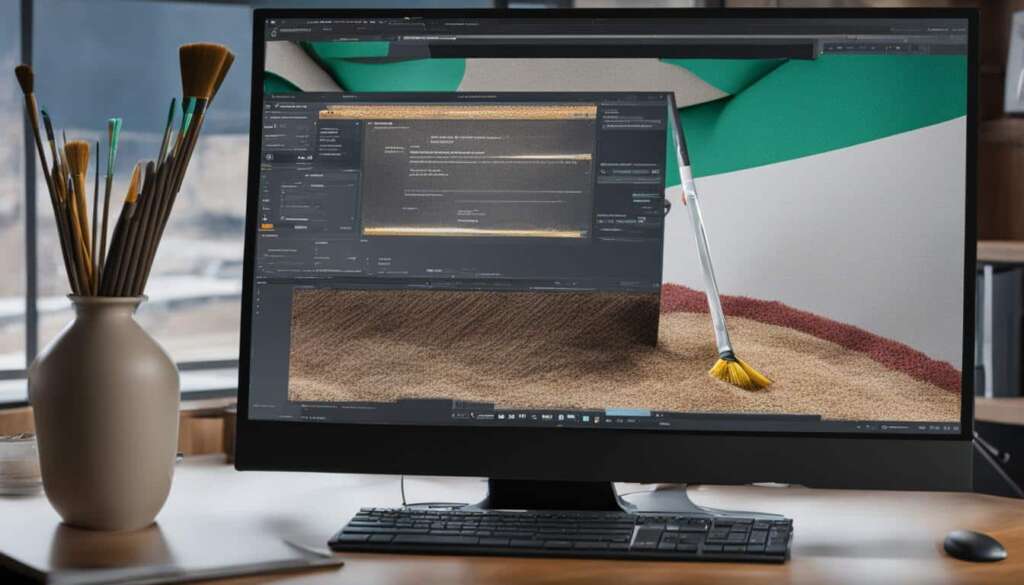Table of Contents
Are you tired of waiting for your downloads to finish? Slow download speeds can be frustrating, but luckily, there are several proven tips to speed up downloads on your PC and improve your overall internet speed. In this article, we will explore various techniques to optimize your connection speed, enhance your Wi-Fi connection, and ensure that you have a seamless downloading experience.
To start, one effective method is to close unnecessary background programs. These programs can consume bandwidth and slow down your internet connection. By quitting unused applications and closing bandwidth-hungry processes, you can free up resources and maximize your download speed. Task Manager is a helpful tool to identify these programs and temporarily end them. Additionally, using Avast Cleanup’s Sleep Mode feature can freeze resource-draining programs when not in use, further optimizing your internet speed.
Another tip is to clear your browser cache regularly. Over time, cached files can accumulate and impact your browsing and download speeds. By removing these temporary files, you can improve your internet speed and optimize your browsing experience. Most browsers, such as Chrome, have a built-in option to clear browser data, allowing you to easily remove cached files and data.
Updating your network drivers and router firmware is also crucial in improving download speeds. Outdated drivers and firmware can lead to performance issues and slower connections. Make sure to visit the manufacturer’s website to find the latest updates for your network drivers and update your router’s firmware through the web interface. These updates can address bugs and enhance the overall performance of your network.
Moreover, a simple yet effective solution is to restart your router or modem. Sometimes, a quick reset can resolve slow internet speeds. Turn off your router or modem, wait for a few seconds, and then turn it back on. This simple troubleshooting step can make a significant difference in download speeds.
An Ethernet connection can provide faster and more stable internet speeds compared to Wi-Fi. If possible, consider using a wired connection by connecting your PC or Mac directly to the router using an Ethernet cable. This can eliminate potential Wi-Fi interference and improve download speeds.
Checking your cable length and ensuring it is free from kinks can also impact download speeds. Using a shorter and higher-quality cable can enhance your internet speed. Additionally, mapping the signal strength in your home can help identify areas with slow download speeds or connection drops. Heatmapper is a useful tool for creating an internet signal map of your home, allowing you to optimize your router’s placement and maximize your Wi-Fi connection.
For users experiencing weak Wi-Fi signals, using a Wi-Fi extender or repeater device can boost the router’s signal and enhance download speeds throughout your home. By bringing the signal closer to your device, you can enjoy faster and more reliable internet speeds.
Limiting the number of devices connected to your router can also improve network performance. Overcrowded Wi-Fi signals can cause congestion and slower internet speeds. By turning off devices that are not in use, you can reduce Wi-Fi signal congestion and improve your download speeds.
Additionally, using an ad blocker and scanning your system for viruses are two effective ways to optimize your download speed. Ad blockers can eliminate data-hungry ads, freeing up bandwidth for faster downloads. Scanning your system for viruses and malware can prevent high bandwidth usage and improve overall performance. Consider using security software like Avast One to efficiently scan and remove any potential threats.
By implementing these proven tips, you can significantly increase your download speeds on your PC and enjoy a faster internet experience. Stay tuned for the next sections of this article, where we will explore how to optimize your PC for faster downloads and provide additional tips to further enhance your download speed and overall PC performance!
How to Optimize Your PC for Faster Downloads
To ensure faster downloads on your PC, it’s essential to optimize your system for maximum performance. By following these tips, you can unlock the full potential of your PC and experience speedier download times.
Uninstall Unnecessary Software
Start by removing any unnecessary software or bloatware that might be occupying valuable system resources. By freeing up space, you can improve overall PC performance and enhance the download speed.
Limit Startup Processes
Reduce the number of programs running at startup to improve boot times and optimize your PC for faster downloads. Use Task Manager to identify and disable any unnecessary startup processes that might be slowing down your system.
Clean Up Disk
Clearing your disk by removing temporary files, offline web pages, and unused installer files can free up valuable storage space and contribute to better overall system performance. Regularly perform disk cleanup to optimize your PC for faster downloads.
Add More RAM
Enhance your computer’s speed and multitasking capabilities by adding more RAM. This upgrade can significantly improve download speeds and overall system performance, allowing for a smoother and faster user experience.
Install SSD Startup Drive
Consider installing a Solid State Drive (SSD) as your startup drive. An SSD can drastically decrease boot times and improve application loading speeds, resulting in faster downloads and an overall snappier performance.
Check for Viruses
Avoid any performance bottlenecks by regularly scanning your PC for viruses and malware. These threats can negatively impact download speeds and overall system performance. Use reliable antivirus software to remove any potential security risks.
Change Power Mode
Optimize your PC’s power settings by changing to high-performance mode. While this may increase energy consumption, it prioritizes system speed, allowing for faster downloads and a more efficient workflow.
Run Troubleshooters
If you encounter any performance issues, such as network connection problems or hardware malfunctions, running troubleshooters can help identify and resolve these issues. Windows provides built-in troubleshooters for various system components, ensuring optimal performance.
By implementing these optimization techniques, you can significantly improve your PC’s performance and achieve faster download speeds. Unlock the full potential of your system and enjoy a seamless downloading experience.
Additional Tips for Faster Downloads on PC
When it comes to optimizing your internet browsing experience and boosting download speeds on your PC, there are several key factors to consider. First, optimizing your internet browser settings can make a significant difference. Disabling automatic updates, enabling caching, and adjusting privacy settings can all contribute to faster browsing and download speeds.
Another important step is to disable unnecessary browser extensions. These extensions can consume valuable system resources and slow down overall browser performance. By removing or disabling redundant extensions, you can free up memory and improve your browsing experience.
Enabling hardware acceleration in your browser settings is another effective way to speed up downloads on your PC. This feature leverages your computer’s GPU to offload graphics processing, resulting in faster rendering and improved performance.
Additionally, utilizing download managers can greatly enhance your download speeds. These managers utilize multiple connections and advanced algorithms to optimize the download process, ensuring faster and more efficient downloads.
Furthermore, it is crucial to keep your system and software up to date with the latest security patches and updates. Regular updates ensure optimal performance and compatibility, reducing the risk of vulnerabilities that can impact download speeds.
To further optimize your PC’s performance, disabling visual effects such as animations and transparency can free up valuable system resources, leading to enhanced overall speed.
Managing virtual memory settings is another vital aspect of optimizing your PC for faster downloads. By adjusting virtual memory settings, you can enhance system responsiveness and prevent excessive disk usage.
Lastly, optimizing your network settings can significantly improve internet speed and stability. Adjusting DNS settings, disabling TCP auto-tuning, and optimizing other network parameters can help maximize download speeds on your PC.
FAQ
How can I improve my Wi-Fi connection speeds?
Getting closer to your router or moving the router closer to your computer can improve Wi-Fi connection speeds. Ensure there are no thick walls between your device and the router. Consider upgrading your router if the signal strength is weak even when you’re near it.
What can I do to speed up my internet connection?
Closing unnecessary background programs and quitting unused applications can help speed up your internet connection. Use Task Manager to identify bandwidth-hungry processes and stop or end them temporarily. Consider using Avast Cleanup’s Sleep Mode to freeze resource-draining programs when not in use.
How can clearing my browser’s cache improve internet speeds?
Clearing your browser’s cache and browsing history can improve internet speeds. Use Chrome’s Clear browser data option to remove cached files and data.
Why should I update my computer and network drivers?
Updating your computer, especially network drivers and router firmware, can address bugs and improve performance. Find updated drivers on the manufacturer’s website and update the firmware through your router’s web interface.
How can restarting my router or modem help with slow internet speeds?
Restarting your router or modem can often fix slow internet speeds. Turn off the router or modem, wait for a few seconds, and then turn it back on again.
What is the advantage of using an Ethernet connection instead of Wi-Fi?
Using a plug-in (Ethernet) connection instead of Wi-Fi can provide faster and more stable internet speeds. Connect your PC or Mac to the router using an Ethernet cable.
How can mapping the signal strength in my home improve internet speed?
Mapping the signal strength in your home can help identify areas with slow download speeds or connection drops. Use tools like Heatmapper to create an internet signal map of your home and optimize the router’s placement.
Can using a Wi-Fi extender or repeater device improve internet speed?
Using a Wi-Fi extender or repeater device can bring the router’s signal closer to you and improve internet speed throughout your home.
How does limiting the number of devices connected to my router improve network performance?
Limiting the number of devices connected to your router can improve network performance. Turn off devices that are not in use to reduce Wi-Fi signal congestion.
Can using an ad blocker or privacy-focused browser help with internet speed?
Using an ad blocker or privacy-focused browser can eliminate data-hungry ads and free up bandwidth for faster internet speeds.
Why is scanning my system for viruses and malware important for improving PC performance?
Scanning your system for viruses and malware can prevent high bandwidth usage and improve overall performance. Use security software like Avast One to scan and remove any threats.
How can uninstalling unnecessary software improve PC performance?
Uninstalling unnecessary software or bloatware can free up system resources and improve PC performance.







